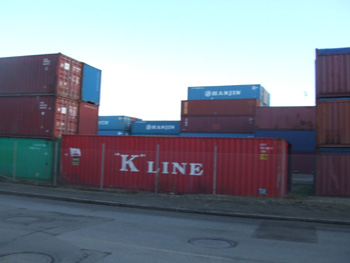We are developing the social individualist meta-context for the future. From the very serious to the extremely frivolous... lets see what is on the mind of the Samizdata people.
Samizdata, derived from Samizdat /n. - a system of clandestine publication of banned literature in the USSR [Russ.,= self-publishing house]
|
Some time ago I had these thoughts about the high price of crude oil and the implications for the energy market. Well, the price of oil has been falling, rather fast, these past few months. High prices have forced people and businesses to economise on their use of oil. Sales of large-engine cars and SUVs are down. A perceived slowing in the pace of global economic growth is also hitting the price. New sources of supply, and spending on new refinery capacity, is also pushing prices down. Some of the speculative froth in the market which may have added to the high price of oil is also unwinding a bit.
The rise in the price of oil to nearly $80 a barrel last year triggered all manner of near-hysterical claims about how governments must act to drastically reduce our reliance on such a source of energy. But market participants were acting even as political and media blowhards predicted doom and gloom. There is nothing like a fast rise in the price of a key thing like energy to focus minds on how to adjust behaviour. The rise in the price of oil has spawned a plethora of ventures to develop new sources of energy; encouraged new drilling and exploration efforts to find new oil supplies, and encouraged people to economise on their energy consumption.
With any luck, if oil keeps falling, it will slow the flow of money into the coffers of thugocracies like Saudi Arabia and also crimp the ambitions of Hugo Chavez in oil-producing Venezuela. That has to be a good thing, although George Galloway might have a problem if oil-rich dictators lose some of their revenues.
I sometimes look at the statistics on the back pages of the Economist. Although I am not generally interested in mathematics and (as a student of the Austrian school) do not regard mathematics as a vital part of the study of economics, I have long had a mild fondness for statistics (I know that to many people that seems a dark perversion to admit, but there we are).
Last week I noticed that the Economist had altered its presentation, whether this is a first issue of the year thing, or will be carried on the next issue I do not know, and I had the feeling that something had been left out.
However, it was only after looking again today that my tired old brain finally worked out was missing. There were no money supply figures.
Nothing for either M0 or MB (basically notes and coins, plus a few Treasury instruments) growth, and nothing for any of the broader measures of credit money (M3 and so on). Certainly measuring credit money growth is not easy (there are lots of arguments) – but no money supply stats at all? At least not in the paper version of the Economist, and it is the paper version that most people, who look at the Economist at all, look at.
Perhaps the young people who now dominate the staff of the Economist believe that inflation, which they may think of as rising prices in the shops, if they are not aware that a rising money supply may also cause asset price rises in such things as the stock market and the property market, comes about by union power: for example, obstructing a entrance of an enterprise by ‘picketing’, or government bans on replacing workers who do not turn up to work – or some other non market means, raising wages which, if the money supply is not increased to pay for wages being pushed higher than supply and demand would have done, really leads to higher unemployment – not to greatly rising prices in the shops or in the asset markets. Or perhaps they believe that it is caused by exchange rates – and that governments, via central banks, should set interest rates to influence these exchange rates (no matter how many times efforts to manipulate exchange rates blow up in peoples faces there is never any shortage of folk advising yet more manipulation).
It is hard to know. After all I am not an economist, I am only a student (in the old sense of the word) of this subject so my level of knowledge of the subject should be well below the standard of economists in Britain. But this is not the case, most economists in Britain seem to know very little about economics. Perhaps this is because there are few economics departments in British universities where even Chicago school (let alone Austrian school economics) is taught – so young ‘trained economists’ get hired by the Economist ‘newspaper’ (as the magazine calls itself) but do not know much about economics.
This would explain, why the Economist supports things like ‘land reform’ (i.e. land theft) in Latin America, the absurdity of government ‘anti-trust’ or ‘anti-monopoly’ policy all over the world (a policy based on the treating the ‘perfect competition’ model of neoclassical economics, with everyone having the same level of knowledge and all enterprises being much alike, as something ‘fair’ that governments should try and create in the real world), and supporting ever more taxpayers money for the ‘public services’ (in most of the countries of the world).
Of course it would not explain why the Economist supports the European Union (although not all its activities), but I can not think of anything that could explain that level of perversity.
Still… I should return to statistics.
The vanishing of money supply stats put me in mind of something that used to annoy me about the United States Annual Abstract of Statistics.
There was no simple presentation of the size of State and local government spending or taxation.
The stats for government spending and tax were given only ‘per capita’, which of course takes no account of the fact that in some States of the United States people have higher incomes than in other States.
Later on on found that till the mid 1970’s the Annual Abstract had also given State and local government spending and taxation per thousand Dollars of income – which (again of course) made it very easy to see what percentage of the economy was going to State and local government in a given State of the United States (if you are interested the private Tax Foundation still provides such information).
Was it all a dark plot to disguise the real size of government in different States? Much as some people have suggested that the liking of the statistical office for the ‘median’ (the number in the middle of a group of stats – for example with “1, 3, 4, 5, 7,” the median would be “4”) rather than the ‘mean’ (get all the amounts and divide by “number of numbers” – what the layman thinks of as an “average”) as its measure of average, is due to a hated of inequality (which using the mean for such things as “average income” is supposed to ignore). I do not think so – I think it is more the fashions of the world of statistics which I, as a non-mathematician, should not expect to understand, although I do not expect the ‘mode’ to become a popular measure of average any time soon.
However, it is irritating that the Statistical Office stopped publishing a useful number, such as total State and local taxes per thousand Dollars of income, but continued to publish a useless number, such as total State and local taxes per capita.
Just as it is irritating that the Economist published inflation numbers (the staff there, like most modern people, perhaps think of ‘inflation’ as price rises in the shops), while not publishing money supply growth figures – as if the money supply could explode and there be no consequences ever.
Alex Singleton has been watching the Running Man. I have just been watching a Newsnight report about mobile phones in Kenya. The gist of the report was that mobile phones in Kenya in particular, and Africa generally, are a stunning success. As if by magic, they are transforming the prospects of ordinary people in Africa, and the relationship between ordinary people and their corrupt, aid-gobbling governments.
We watched a deeply impressed BBC reporter, Paul Mason, being told by a black lady, who I rather think may have been one of the authors of this report that indeed, mobile phones are having an impact upon Africa comparable to the switch from dictatorship to democracy – she mentioned other technology as well, like fire, the wheel and the railways – and that the mobile phone industry provided a model for progress in other areas of African life, such as education and healthcare. Her message to the governments of Africa: get out of the way, at let the business people do these things, and the people pay for these things, themselves.
Paul Mason went deep into the Kenyan countryside, braving the chaos of Kenya’s government supplied road system, into Masai territory, to study the difference between places where mobile phone technology was working its magic, and where the wretched of the earth did not have mobile phones. He was, in other words, looking for one of those gaps. But he did not find any gap. The Masai already have their mobiles, and they love them.
Not all the news nowadays is good, to put it mildly, but this Newsnight news was very good news indeed, and not just because of its news about Africa. It was what it said to me and to my fellow countrymen, and (via the BBC’s excellent internet operation) to the entire world, that really pleased me.
It is some time since the book was published, but as I am increasingly finding due to pressures of time, I only recently managed to finish the book “1421, the Year China Discovered the World”, written by former Royal Naval submariner Gavin Menzies. He writes in the tradition of revisionist historians who, fired by a sense that a group of people have been done a great injustice – the Chinese treasure fleet sailors – puts his own skills to righting a perceived wrong. It is an enthralling read, drawing on Menzies’ own navigational knowledge and seamanship, his thirst for adventure and historical knowledge, and above all, by an almost Sherlock Holmes-like ability to track down awkward facts to build a case.
The case is a pretty powerful one, although there are some holes in it, at least on a first reading. What makes the book enjoyable all the way through is that it does not strike the reader that Menzies is full of that tedious modern desire to debunk the achievements of great men in order to exalt his own cleverness. This trait, this desire to show that certain brave folk have feet of clay, bores me to tears. Menzies reveres Cook, Magellan and other European explorers, but he feels the Chinese, who put together massive fleets of enormous sailing junks, have been the victims of undeserved obscurity.
Without spoiling the book for those who have not read it, what Menzies does is to show how certain maps of the mid and late 15th centuries, used by the Portugese and folk such as Columbus, could not possibly have contained the information in them without someone having done the prior work of charting certain areas. He finds all kinds of evidence: fauna, flora, jewellery, stoneware, and patterns of trade. He shows how the Chinese, centuries before Englishman John Harrison invented his vital chronometer, cracked the problem of accurately measuring longitude. Menzies’ navigational expertise is vital to showing how maps of the Middle Ages, when corrected for certain errors, make sense for the modern navigator (as an amateur yachtsman myself, I find this sort of stuff fascinating).
I have a few problems though with this thesis, although they may not be fatal to it. First of all, the mandarin-run China destroyed pretty much all the known written evidence that the voyages that Menzies writes about took place. Several of the admirals who led the expeditions were killed or disappeared. Thousands of their sailors died or found shelter in the lands on which they were shipwrecked. Although a European monk – converting to Islam to avoid problems, perhaps wisely – apparently sailed on the ships and transmitted evidence of the expeditions, it is often rather hard to see how the details that Menzies uses to base his claim can be assembled coherently. I find it frankly incredible that not one major Chinese sailing officer ever laid down independently verifiable accounts of his actions and voyages and that those accounts were all destroyed. The probabilities of such an outcome strike one as low. Menzies relies to a large extent on informed and clever conjecture. But conjecture is what we have and I am not sure how all this would pass muster in a court of law.
→ Continue reading: The Chinese got there first – quite possibly
A few days ago, Perry de Havilland suggested the rather cute idea of erecting statues of the US Senators who cooked up the Sarbanes-Oxley accounting law, on the grounds that this law has encouraged many firms into listing their businesses outside the United States and holding Initial Public Offerings (IPOs) outside Jefferson’s Republic. London’s stock market has benefited from this, as have bourses such as the Amsterdam Euronext, for instance. I do not know whether some of the impact of S-O has been exaggerated – this may be the case – but there is no doubt that from a regulatory point of view, the United States is not quite the model of laissez-faire capitalism that its supporters or indeed opponents imagine it to be. In fact, the US has been becoming a regulatory hell-hole for some time, such as with the recent crackdown on online gambling, to take one example.
Another man who deserves some sort of award for unintentionally driving business away from America is departing NY Attorney-General Eliot Spitzer. He is stepping down from the job to run for political office, and some say he has been doing that while in his present role. While some of his highly public campaigns to crack down on dodgy dealings should be applauded by free marketeers on the grounds that markets need laws against fraud, some of his campaigns seem to be driven more by the wrong-headed belief that markets must in some sense be “fair” and “perfect” in order to work in the interests of the general public. The mistaken idea that markets must contain no barriers to entry, contain “perfect” information and so on, has done incalculable harm to real capitalism, as also seen in the absurdities often perpetrated in the name of “trust-busting”. In his campaign against biased stock market research, for instance, Spitzer seems to downplay the old wise dictum, “let the buyer beware”, and presume to protect the customer against the shock-horror fact that banks might not be models of Olympian objectivity. There is a good and passionate attack on Spitzer’s record here.
Spitzer did some good but also a lot of harm to Wall Street and beyond. Competing financial centres, possibly including the rapidly-growing hub of Dubai, will rush in to fill the gap as capital becomes ever more fluid in this information age (yes, you read me correctly, I said Dubai, notwithstanding the local regional, er, difficulties).
In case any US readers get all hot under the collar about yours truly, a Brit, taking a prod at the US economy, I am only too well aware of how Britain is falling under the same regulatory menace, both of the home-grown and EU varieties. We all lose if the world’s biggest free economy becomes encumbered by bad laws.
My co-Samizdatista Brian Micklethwait has some comments on the fact that British retailers had a bad Christmas, and that people did not really get spending until the last few days, when shops had pre-Christmas sales and dropped their prices heavily. I think the real story is actually this one. Britain’s high street stores have horrible cost structures, which they have been able to get away with because they have traditionally faced relatively little competition. For this, as for almost everything, I blame planning laws. Large shopping malls – particularly large out of town shopping malls – barely exist in Britain, as their growth has been hindered by government on supposed aesthetic grounds, and to “prevent the ruin of our high streets”. Of course, the people who pay for this are consumers through high prices. Retailers charge high prices and pay high rents. Landlords pay high mortgages rates, and economic value is generally destroyed.
In the past few years, parallel retail channels (not just the internet, but that is the biggest one) have sprung up without the high cost structures and with much lower prices. Most people would actually prefer to shop in a store at Christmas time, as this makes it much easier to take goods back later and/or get customer service, but they will not do so if goods are dramatically more expensive. So, they hold off buying, playing a game of chicken, and eventually prices drop a couple of days before Christmas (however the internet retail sector has boomed right through the Christmas season). Economic theory is pretty clear that in a perfectly competitive market, retail prices approach marginal costs. In vaguer terms, the more competitive a market, the more prices relate to costs. The British retail market is certainly not a perfectly competitive market, but it is closer to one than it was a decade ago.
Inevitably, with collapsing margins come situations where shops can no longer afford to pay their rent. One would expect this to lead to either a fall in rental yields and ultimately retail real estate values, or a change in use of a lot of retail space from retail to residential or to offices, given that London’s residential real estate market is booming. A further possibility is of course an improvement in customer service, as bricks and mortar retailers attempt to provide additional value for higher prices. However, another possibility is that it leads to even stronger planning laws aimed at preventing this and further trying to “save our high streets”.
Interestingly enough, the stores that are suffering the most are probably not the quirky independent stores that the Evening Standard loves to champion as much as the less well run high street chains: shops that sell boring, goods that can be easily sold in bigger shops or over the internet. People like Dixons and Woolworths. Well run businesses, most notably Tesco, do fine of course.
Actually, come to think of it, the Dixons name has vanished from the High Street, as the stores have all been rebranded Currys, except for the airport stores, which are still Dixons. The answer to why this is is quite an interesting one. DSG International (aka Dixons Group) hit an interesting problem, which other retailers have also encountered when setting up internet businesses. One would think that an electrical retailer with high street stores would have certain advantages setting up an internet retailer. Because people have heard of them they are more likely to trust that they will still exist tomorrow. They can use the bricks and mortar stores to handle returns and after sales service.
The trouble with this in the electronics business in Britain is that internet retail prices are dramatically lower than high street prices. Customers who see a price on the internet from a brand retailer expect to be able to get the same price in a store of that same retailer. If they cannot do so, they feel cheated. Therefore Dixons was between a rock and a hard place. Either they made their internet prices so uncompetitive that they would not sell anything online, or they annoyed the customers of their bricks and mortar stores by refusing to offer them the same prices they offered online. The solution was to use the Currys brand (which they had long used for their out of town retail park stores) for their high street stores as well, and to use the Dixons brand merely for online retail. And for airport stores, as nobody expects prices in airport stores to be the same as elsewhere. On the website, they leave subtle signs that they are the same customer to reassure online customers that they can be trusted, but hopefully not enough to make potential bricks and mortar customers think that they are being cheated by not getting the same prices.
As another example: consider these three websites. One. Two. Three. They are all the same company, which is a big presence in the British High street. The first website is branded the same as the high street retailer, and offers more or less the same prices it does. The second website is clearly but less obviously connected to it, and offers lower prices. The third is less obviously connected to it still, and offers lower prices still. It is really quite clever.
The more I read about the flood of money coming into the City of London from the United States, the more I am convinced that in the spirit of Christmas and fraternal Anglosphere conviviality, the people of London should say a heartily thank you to Maryland Democrat Paul Sarbanes and Ohio Republican Michael Oxley.
In fact, in the new year I plan to launch a subscription appeal to put up a pair of gold plated statues somewhere in the square mile, depicting these two fine politicians throwing handfuls of dollar bills to a multitude of grateful City of London bankers, fund managers, stock brokers and other sundry worthy capitalists, as great numbers of companies decamp from New York and list in London instead.
And so Paul and Michael, on behalf of all those fine folks here in Merry old England whose Christmas bonus packages have gone through the roof, thank you. We could not have done it without you. God bless globalisation.
Reason magazine’s Brian Doherty (he of Burning Man fame) has written a nice piece looking at the controversial role the late Milton Friedman played in advising economic reforms to the government of the late, and not-very-lamented, Augusto Pinochet of Chile.
The New York Times columnist Anthony Lewis declared in 1975 that “The Chilean junta’s economic policy is based on the ideas of Milton Friedman…and his Chicago School…if the pure Chicago economic theory can be carried out in Chile only at the price of repression, should its authors feel some responsibility?” Such attitudes haunted Friedman to his death and beyond.
The reaction of some of the usual conservative suspects to Pinochet’s death didn’t help debunk this unfortunate association. Since he was a pro-American autocrat, who ultimately honoured a plebiscite and stepped down, portions of the American right have always had an unhealthy affection for the general. National Review ran both a symposium and a stand alone piece by former editor John O’Sullivan marking Pinochet’s passing, neither of which were much outraged about his crimes. O’Sullivan explicitly said , in the sort of bizarre moral prisoner exchange that partisan squabbling generates, that sure, Pinochet should suffer for his villainy – but only if Castro and Allende’s associates do as well.
I agree with pretty much every word of Doherty’s analysis, and his punchline is good:
Undoubtedly, Friedman’s decision to interact with officials of repressive governments creates uncomfortable tensions for his libertarian admirers; I could, and often do, wish he hadn’t done it. But given what it probably meant for economic wealth and liberty in the long term for the people of Chile, that’s a selfish reaction. Pinochet’s economic policies do not ameliorate his crimes, despite what his right-wing admirers say. But Friedman, as an economic advisor to all who’d listen, neither committed his crimes, nor admired the criminal.
Those leftists who nitpick at the late economist for his role in advising the Chilean regime have only the tiniest of legitimate reasons for bashing Friedman, I think. Considering that he was a man who made the case for abolishing the draft, decriminalising drugs, promoting school choice and so forth, his credentials as a pro-liberty guy were pretty much impeccable.
“Progressive taxes do not redistribute income. They redistribute taxpayers.”
George Gilder, one of the early evangelists for “supply-side” economics, which is a fancy way of saying that he thinks people respond to incentives, considered a wild-eyed idea by some people.
It is presently 2.42 am in Seoul. I am suffering from jetlag (Making an eastern journey with a nine hour time difference is especially brutal). I went to bed at about 6pm yesterday evening, and I have therefore just woken up, and I have a few hours to while away, . Buying an international power adaptor in the largest electronics market in Asia did not turn out to be particularly difficult, so thankfully I do not have to ration electrons this morning and I have my laptop and the internet. This makes lying awake in a foreign city with jetlag somewhat more bearable than it has been at some times in the past, and it makes the hour I spent making sure that the versions of my music and photo libraries, my e-mail archive, and various other things that are stored on my laptop were fully up to date were well worth it.
In a way, though, this is kind of relaxing. I have no other obligations for the next few hours. The last few months have been extraordinarily hectic for me. My team at work has been seriously understaffed (we have had great difficulty hiring good people), it has been bonus season, and the total workload has risen. I have been working ridiculous hours, and things like blogging have been lost in the rush. Suddenly, though, I am on holiday, and due to the absence of any GSM mobile phone networks in Korea my mobile phone and Blackberry suddenly don’t work, so my colleagues do not know how to contact me even if they wanted to. I am out of touch and have no immediate obligations to anybody, particularly when jetlagged early on a Sunday morning.
However, I do have an obligation to the people of Samizdata. I am yet to explain why I was in Denmark on November 11.
The reason is actually fairly simple. I went to see Emma Maersk, the largest container ship in the world, at the end of its first trip from Europe to Asia and back. After being built in the shipyards of the Danish city of Odense and being christened on August 12, the ship had sailed from its home port of Aarhus to Gothenburg, Bremerhaven, Rotterdam, Algeciras, the Suez Canal, Singapore, Yantian (Shenzhen), Kobe, Nagoya, Yokohama, Yantian, Hong Kong, Tanjung Pelepas, the Suez Canal, Felixstowe, Rotterdam, Bremerhaven and Gothenburg, and was scheduled to arrive back in Aarhus at 1pm on November 11. Upon reading about the ship in various places, I thought it would be nice to go and actually look at her. I could have gone to see her in Felixstowe in Suffolk on November 4, but that was a weekday. In any event, low cost air travel in Europe has reached the point where it is no harder or more expensive to go to Aarhus than it is to go to Felixstowe, so I thought “what the heck” and spent about $60 on a return plane ticket.
After getting to Aarhus, and a semi-leisurely half hour in a coffee house, I headed down to the port. The AP Moller terminal was on the far side of the port, and I knew I would have a lovely view of the ship across the harbour if she were in the berth closest to the harbour entrance. If she was to dock at a berth further up the port, there would be other terminals in the way. But in any event, I would have a nice view as she sailed into the harbour. I might have to wait in the cold for an hour or so, but I would at least see her come in, which was why I was in port.
However, I was thoroughly confused when I walked to the harbour and saw this.
Yes, it was a big container ship in Maersk livery that looked exactly like the pictures of the Emma Maersk I had seen in photographs, but it was there prior to the scheduled arrival time, and it was not carrying a large load of containers, as one would expect if it had just sailed in from China. I knew that Maersk were building more ships in the same class, but I had not realised that any were completed. So I spent the next couple of hours wondering whether Emma Maersk had arrived early and had been rapidly unloaded (but container ships like this are never completely unloaded), whether I was confusing a smaller ship in a different class with Emma Maersk, or whether a new ship had arrived in port prior to its maiden voyage. Only one of these explanations made consistent sense, but I did not want to miss seeing what I had come for, regardless of explanations and sense.
In any event, the view was not very good. I needed to walk around the harbour to get a better view, at least to the extent that I was permitted to. (People tend to sometimes get nervous these days when you wander around and take photographs of critical infrastructure). And I wasn’t sure where the roads went, and stuff like that. However, I gradually made my way around the port, towards the outer breakwater and the AP Moller terminal.
I do like the observation that I could be prosecuted. Presumably, after they figured out I was a banker/blogger/ship spotter/Danish cheese fan/beer drinker, I would not have been prosecuted, but it was in truth a good thing that I turned around and left the Secure Maritime Area, because I would not have otherwise reached the outer breakwater in time
When I got there, I now had a much better view of the AP Moller terminal, the ship already in port, and the open sea. And look what was sailing towards port?
Clearly, this was Emma Maersk. → Continue reading: Watching big ships
If you want to make money, work directly with money.
– Bernie Cornfeld’s explanation of Jonathan’s puzzle. Financial markets seek meaning, and discount luck. Financiers are therefore in a strong position to get rent from their luck as well as their brains. And a lot of other people’s money passes through their hands, so they do not have to worry about cashflow much.
Considering that investment bankers at places like Goldman Sachs and Morgan Stanley are paid the sort of money that sounds like a respectable cricket score, economics writer Arnold Kling asks the question: why is the supply of people to do this job not rising in response to a very juicy lump of money? It is a good question to ask. For the sort of money on offer, even a maths dunce like your humble scribe might want to learn to do the job and start figuring out the the clever-dick arts of hedge funds, credit derivatives and leveraged buyouts. So why is the supply not rising? I think some of this may be caused by a lack of talented folk coming out of our education system, but that cannot really explain it over the long-term. It may be that getting the level of experience to do these jobs is quite high, raising the scarcity and hence the massive rewards. Of course when these guys get fired for failing to perform, this rarely bothers people who get upset about the big salaries.
These guys have a rather, er, different take on the matter.
|
Who Are We? The Samizdata people are a bunch of sinister and heavily armed globalist illuminati who seek to infect the entire world with the values of personal liberty and several property. Amongst our many crimes is a sense of humour and the intermittent use of British spelling.
We are also a varied group made up of social individualists, classical liberals, whigs, libertarians, extropians, futurists, ‘Porcupines’, Karl Popper fetishists, recovering neo-conservatives, crazed Ayn Rand worshipers, over-caffeinated Virginia Postrel devotees, witty Frédéric Bastiat wannabes, cypherpunks, minarchists, kritarchists and wild-eyed anarcho-capitalists from Britain, North America, Australia and Europe.
|









